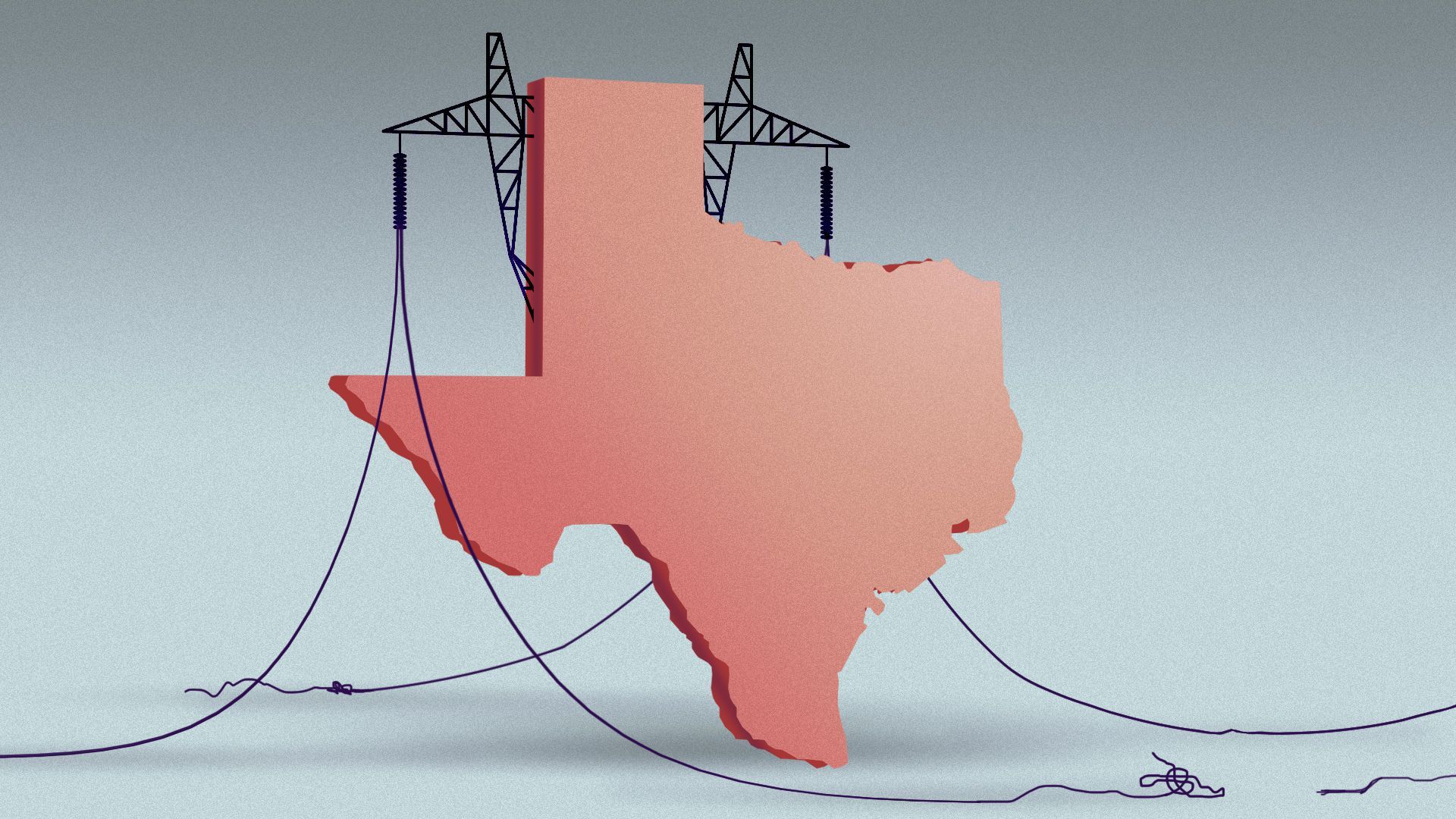| |
| |
| |
| Presented By Energy for Progress |
| |
| Generate |
| By Ben Geman ·Feb 22, 2021 |
| Good morning. Today's Smart Brevity count is 1,202 words, 4.5 minutes. 🚀 Launching today: Axios Closer, an afternoon biz newsletter written by Courtenay Brown. Sign up here. 🎸 And Saturday marked the 1974 release date of Steely Dan's "Pretzel Logic," which provides today's intro tune... |
| |
| |
| 1 big thing: Probing the Texas power disaster |
 |
|
| Illustration: Annelise Capossela/Axios |
| |
| Investigations of the Texas electricity crisis — a disaster with fatal consequences — are proliferating in the state and the Beltway. Why it matters: The inquiries could bring regulatory changes to Texas' independent grid aimed at better preparation for extreme weather. They could also bring new protections against massive power costs in Texas' freewheeling market that expose people to bills that reach thousands of dollars. Driving the news: The various plans or calls for inquiries include... - Texas' public utility commission on Friday launched a probe of the "factors that combined with the devastating winter weather to disrupt the flow of power to millions of Texas homes."
- Rep. Ro Khanna (D-Calif.), a key member of the Oversight and Reform Committee, tweeted he's launching an investigation that will include "why so many fossil fuel sources failed, why ERCOT wasn't better prepared, & who participated in the conspiracy to falsely blame renewables."
- Texas Attorney General Ken Paxton on Friday formally demanded copies of communications and other documents from ERCOT and Texas power companies related to the event.
- Sen. Tina Smith (D-Minn.), in a letter Saturday, urged federal energy and commodity regulators to explore the huge spikes in natural gas prices in multiple central U.S. states during the cold snap.
Catch up fast: The flurry of activity follows previously announced efforts and inquiries. - House Speaker Nancy Pelosi has said the House Energy and Commerce Committee is planning an inquiry, while Texas Gov. Greg Abbott has demanded a state legislative investigation.
- The Federal Energy Regulatory Commission's sway over Texas' independent grid is limited. But it has begun looking more broadly at several states' power system performance in winter conditions and Chairman Richard Glick last week said he's open to new mandatory requirements that would cover Texas.
What's next: Via KXAN, an Austin NBC affiliate, officials from ERCOT and the public utility commission will appear before state lawmakers this week. "The Texas House State Affairs Committee and Energy Resources Committee will hold a joint hearing on Feb. 25, as will the Senate Business and Commerce Committee," it reports. * * * Reuters looks at the environmental consequences of the energy crisis, noting that last week oil refiners in the state "released tons of air pollutants into the skies." "Shutdowns led to the refineries flaring, or burning and releasing gases, to prevent damage to their processing units," it reports. |
    |
| |
| |
| Bonus: Financial fallout from the Texas crisis |
| Beyond the consumer impacts of the crisis noted above, massive price spikes at several natural gas hubs are having pretty disparate effects. - Via Bloomberg, "Atmos Energy Corp., one of the largest independent suppliers of gas in the U.S., revealed Friday it's looking to raise cash after committing to spend as much as $3.5 billion to secure fuel during the freeze."
- But as they and others have reported, it's a windfall for some energy companies. Roland Burns, president and CFO of the natural gas producer Comstock Resources, likened it to "hitting the jackpot" on an earnings call last week.
|
    |
| |
| |
| 2. On our radar: Biden's Interior pick faces grilling |
| Rep. Deb Haaland, President Biden's pick to lead the Interior Department, will appear Tuesday morning before the Senate Energy and Natural Resources Committee. Why it matters: Haaland's nomination is groundbreaking because if confirmed she would be the first Native American cabinet secretary. - But she's also likely to face tough questioning from Republicans upset over her views and Interior policies that Biden has already begun implementing.
- They include a freeze on new oil-and-gas leases on federal lands and new restrictions on permitting.
What they're saying: This new Bloomberg piece delves into the fault lines over Haaland's nomination, though it notes she's still likely to be confirmed. - It points out that Montana GOP Sen. Steve Daines tweeted about "serious concerns with Rep Haaland's radical views and support for the Green New Deal" and will seek to block her unless they're addressed.
- But Julian Brave NoiseCat of the progressive group Data for Progress said: "She's going to bring a commitment to environmental and climate goals to an agency that under Trump was run by actual folks who had worked for fossil fuel corporations."
|
    |
| |
| |
| A message from Energy for Progress |
| Meeting energy needs and tackling climate change isn't either/or |
| |
 |
| |
| Meeting energy needs and tackling climate change isn't either/or. What this means: We have to do both. Innovative partnerships and technology drive solutions for energy customers, our economy and our environment. Let's make even more progress together. |
| |
| |
| 3. The coming offshore wind jobs boom |
 Reproduced from Rystad Energy; Chart: Axios Visuals The consultancy Rystad Energy sees lots of job growth coming in the offshore wind power sector this decade. The big picture: They see global installed offshore wind capacity reaching 110 gigawatts by 2025 and 250 GW by 2030, and "this prolific growth will require a lot of skilled employees." How it works: Their tally captures a range of positions, ranging from turbine manufacturing to maintenance at offshore facilities to workers at plants supplying steel and electronics. What we're watching: Growth in the U.S. sector, which has been very slow to get off the ground and has no large-scale projects operating yet. - They see the U.S. reaching 15 GW of installed capacity by 2030, which is lots of growth but still puts the U.S. very far behind Europe's more mature market.
- "Europe, which dominates the offshore wind installed capacity globally, could expect to see demand for jobs more than triple by 2030, from 110,000 jobs in 2020 to around 350,000," Rystad notes.
|
    |
| |
| |
| 4. The electric SPAC wave rolls on |
| Xos Inc., an electric truck company that counts UPS among its customers, said this morning that it's going public at a $2 billion valuation via a reverse merger with NextGen Acquisition Corp. Why it matters: The California-based Xos' deal is the latest in a wave of electric vehicle companies going public via mergers with special purpose acquisition companies, signaling heavy investor interest in the sector. The big picture: The announcement states that demand for "last mile" commercial EVs is slated to soar in coming decades as the trucks "replace traditional fossil fuel vehicles, driven by new emissions standards, continued growth of e-commerce and the relocation of fulfillment centers to areas closer to consumers." Yes, but: It's an increasingly competitive space, with lots of money pouring into companies with few or even no vehicles on the roads, and the electric models remain a niche — if growing — slice of commercial and passenger markets. Go deeper: |
    |
| |
| |
| 5. Hybrid planes are on the horizon |
 |
|
| Illustration: Sarah Grillo/Axios |
| |
| Axios' Joann Muller reports that hybrid-electric aircraft will soon kick off a new era of cleaner air travel, just as the pioneering Toyota Prius heralded the start of the electric car movement 20 years ago. Why it matters: Replacing small regional planes that run on fossil fuels with hybrid or electric aircraft would help reduce climate-damaging CO2 emissions. It could also make air travel easier and cheaper for people living in smaller cities not served by major airlines. The big picture: CO2 emissions from aviation have risen rapidly over the past two decades, reaching about 2.8% of global CO2 emissions from fossil fuel combustion, according to the International Energy Agency. - And with passenger air travel growing at about 5% a year — except during the pandemic — airlines have been scrambling to lower their carbon footprint.
State of play: Fully electric planes, while promising, are limited by available battery technology. - Batteries cost less and pack more energy into a smaller package than they did a decade ago, but they're still too heavy to allow planes to fly long distances or carry heavy loads.
- They do work, however, in low-flying air taxis for short runs across a city or to the airport.
- These new electric vertical takeoff and landing (eVTOL) aircraft are getting a lot of attention on Wall Street, but they won't be widely available until around 2035, according to a Deloitte analysis.
Yes, but: For medium distances of 50 to 500 miles — the city-hopping routes ignored by hub-and-spoke airlines — hybrids offer a practical solution that can be ready in just a few years. Read more |
    |
| |
| |
| A message from Energy for Progress |
| What can be achieved by working together on cleaner energy |
| |
 |
| |
| Americans don't have to choose between reducing CO2 and keeping America powered. The reason: Reliable energy and innovative climate solutions are powering progress, so that it's possible to do both. Learn how we're doing more together. |
| |






No comments:
Post a Comment